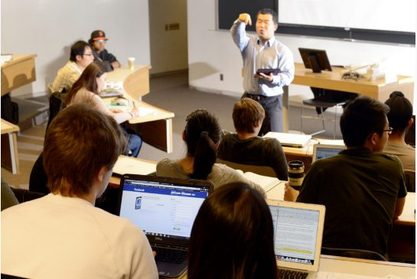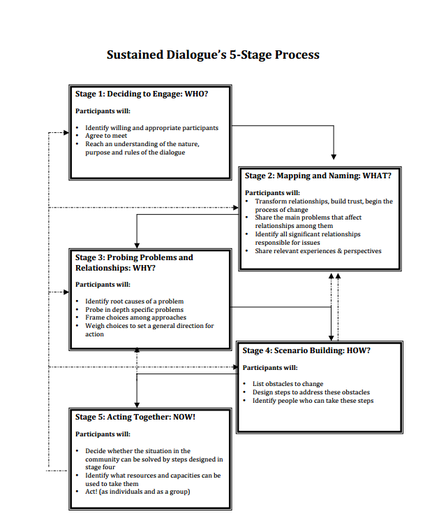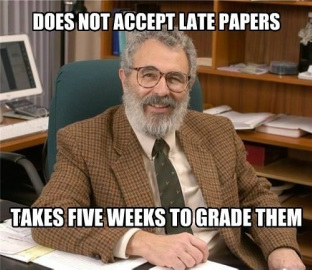Look, you can’t study the entire time. And although I believe you when you say that holing up in your dorm room with some friends to play video games or binge-watch Game of Thrones are ways of socializing, that’s not something you can add to your resume.
Whether you plan on looking for a job, applying for graduate school, or seeking funding, you need to build a competitive resume while in school.
Strategic resume building as a college or grad student includes focusing on one or two activities and demonstrating an ongoing commitment through increased involvement over time. Perhaps you start out as a participant your freshman year, and graduate as the club’s treasurer. Or you offer to help with event planning and fundraising. Maybe you even team up with students from other schools, and expand your organization to include other campuses.
I want to highlight two national organizations available at some of the nation’s leading universities, emphasizing the advantages of joining these or starting your own.
Sustained Dialogue Campus Network (SDCN)
SDCN’s mission is to develop everyday leaders who engage differences as strengths to improve campuses, workplaces, and communities.
WHAT IT ISSustained Dialogue is about conflict resolution through effective communication. Too often that which is foreign to us is interpreted as a threat. We see this in the context of international crises all the time. But students know this also happens on campus. People elect to self-segregate in the dining hall, in the classroom, or in dorms. Perceived differences sometimes manifest themselves as rivalries, or, worse, enmity. Sustain Dialogue is a tool to mitigate conflict by altering our perception of those we deem foreign, different, "other." The premise is to keep talking, because it is through conversation the unknown becomes familiar. SDCN'S HISTORYSustained Dialogue Campus Network is the invention of Dr. Harold Saunders, a conflict resolution expert with over 40 years of experience. In the 1980s Dr. Saunders served as the Deputy Assistant Secretary of State to Henry Kissinger, helping mediate the Arab-Israeli peace agreements. In 1992 Dr. Saunders implemented the 5-Stage Process of Sustained Dialogue in Tajikistan, after the dissolution of the Soviet Union prompted a civil war. In 1999 Princeton students began drawing on Sustained Dialogue to navigate issues associated with race relations on campus. In 2002 Dr. Saunders founded the International Institute for Sustained Dialogue (IISD), and the program spread to the University of Virginia and Dickinson College. SDCN is now a high priority for the IISD, teaching future leaders how to resolve conflict and establish relationships through continued dialogue. WHAT STUDENTS DO
Lets say you hear about this SD thing on campus and decide to check it out. An organizer tallies up participants and breaks them into small groups of 5-8, with 1-2 moderators. This is your core group, which will meet on an ongoing basis for the remainder of the year. The moderator is there to provoke discussion, as well as facilitate communication when group members are nervous, angry, or unsure of what to say. The participants are deliberately matched so as to challenge each other. Groups are meant to self-direct the topics of conversation, with an emphasis on identifying and addressing problems on campus related to racism, sexism, homophobia, or other forms of conflict.
Meetings can get tense - crying, angry words, or silence - but the point is to keep talking through the uncomfortable moments.
WHY IT'S WORTH LOOKING INTO
I was a member of Notre Dame’s Sustained Dialogue chapter during my undergraduate years, starting as a participant and then working my way up into a leadership position. In 2007 I attended the annual training at Princeton University, where I met the organization’s founders and heard more about SDCN’s vision for the future. This includes expanding SDCN chapters to more college campuses, changing the way future leaders understand and approach conflict.
My SDCN training stayed with me long after Notre Dame. The emphasis on conflict resolution prepared me for navigating difficult conversations with family members, ornery professors, and demanding clients. Trust me - when SDCN is on your resume, someone will ask you about it during an interview.
Prospective graduate schools and employers are usually intrigued by the concept and impressed with SDCN’s ability to prepare people to be leaders who leverage diversity to improve our communities and workplaces.
Getting Involved There are a few ways you can participate in SDCN:
- See if SDCN has a program on your campus and become a member
- Initiate a chapter on your campus
- Apply for a job, internship, or volunteer position with SDCN
Check out Part II, detailing how two former SDers from Princeton started their own national organization, Students For Education Reform.
From Left to Write asks reviewers to connect the book of the month with their personal experiences. Accordingly, this is not a traditional book review, but rather, my response to this month’s selection. Find out more here. I received an advance copy of Mother, Mother for free, but I was not compensated in any way for this review. My comments are my own. Mother, Mother is available for purchase now.
So You Know What I'm Talking About... Violet Hurst, along with her siblings, grew up in a dysfunctional household with an alcoholic, emotionally absent father, and an overbearing, abusive mother. The narrative is split between sixteen-year-old Violet’s account and that of her twelve-year-old brother, William. The eldest sister, Rose, has been missing for over a year.
The story opens with Violet in a psychiatric ward, ostensibly for attacking William the previous night. Yet Violet has no recollection of doing so. The story revolves around two major questions. First, what really happened the night her mother claims Violet came after her brother with a knife? And second, what role did her mother play in Rose’s disappearance?
I do not want to ruin the book for any of you out there who are interested in reading it, so I am not going to delve into the plot too much. Instead, I want to focus on a few of the book’s themes and how they relate to my clients, young adults pursuing a college education.
This is a long one. I want to talk about finding happiness, questioning "truths" about you and your character, and the problem with constantly comparing yourself to others.
Let's Talk About It: Finding Your Happiness
By the end of the book, Violet has not found her happiness, but she knows she is on her way. And, yet, she is also cognizant that the person who will hold her back from enjoying her life is herself. She observes,
“…Violet was confronted by this small pickle: she was apologetic about wanting to live for her own enjoyment. She felt really guilty about having her own identity, and doubly f***ing terrified when she experienced something beautiful or even pleasant, accustomed as she was to her mother ruining it, usurping it, or passing it off as inconsequential.”
My path to academic, professional, and personal fulfillment was one marred by self-doubt and confusion about whose expectations I was supposed to be living up to. On the one hand, my parents made it clear that it was important to be smart, and to have your intelligence acknowledged by others.
I went to the University of Notre Dame, and despaired when my GPA was only a 3.8 when I graduated (freshman year Calculus and Physics destroyed me).
I continued on to Harvard for my Master’s, where I cried (!) over a B. One B out of 8 semesters. But it might as well had been an F.
I enrolled in a PhD program at Arizona State University. I really just wanted to be a teacher, but felt like others expected me to do something more prestigious, and barreled on down the path to becoming a professor and scholar of Russian History. Nevermind if these external pressures were imagined or real; I felt compelled to finish what I'd started. Even if I didn't want the prize anymore.
Over the next three years my ambivalence turned into outright resentment. I was furious that I was being “forced” to get my PhD, for a career I stopped wanting a long time ago. I wanted someone to tell me, “Hey, Jessica, it’s ok. You don’t have to do this. Go do whatever it is that you actually want to do.”
Finally, I was approaching a complete meltdown. I had passed my Qualifying Exam, my committee approved my dissertation proposal, and I received a competitive national fellowship to complete archival research in Russia for the next seven months.
My husband was the one who suggested I speak with my adviser. I do not know if she realizes what a life-changing moment our conversation was for me. She is still my model of what an ethical teacher should be, telling me my happiness was more important than her obligation to graduate PhD students. She suggested I stop worrying so much about making my parents happy and do what I wanted. She told me I could be good at anything. That I was already good enough.
When you spend an entire lifetime thinking you aren’t anywhere near good enough, and in most cases, severely lacking, this was news to me.
So then what? My husband, my other great supporter, championed me on as I devised a business plan, launched Aim High Writing, and refashioned myself into an Applications Coach. My parents also helped me make the transition, allowing me to see that they had actually just wanted me to be happy and successful.
Now I am happily operating on the periphery of academia, in a teaching role, but not a professor. No prestigious institutional affiliations, but excited to help those students who want them for themselves. And it turned out that I have always (and will always) have a choice about finding and following what makes me happy.
Unlearning So-Called Truths About Yourself Still reading?
I want to highlight a more subtle plotline that will potentially resonate with young adults, as it did with me. Violet’s separation from her family allows her the space to examine the so-called truths about herself that her mother has ingrained in her.
According to her mother, Violet is a screw-up, messy, stupid, violent, ugly, undisciplined, and socially inept. Over time, Violet internalizes her mother’s words into truths, and even manifests them by shaving her head, experimenting with hallucinogenics, and finding herself terribly angry.
Towards the end, Violet’s friend, Edie, tells her she needs to unlearn all the things her mother told her she was. Violet finds this task daunting; she has spent so long surviving, she does not understand what it means to just live.
You do not need to come from an abusive household to accumulate a set of potentially toxic “truths” about yourself by the time you are a young adult looking to leave home.
My interest in books, combined with my reserved nature, earned me the reputation for being shy. And I was. I was hideously shy throughout middle school, high school, and my freshman year of college. I turned down invitations to go to parties, I assumed any guy showing interest in me was just messing with me, and I accepted lower grades in classes because I refused to participate.
Starting my sophomore year of college, however, I became interested in taking Russian 101. Language classes terrified me. All that interaction with my classmates, speaking in my infantile Russian with an atrocious accent….
After leaving my PhD program, I became a business owner. I felt like my most authentic self for the first time, speaking with people about how I could help them with academic and professional goals. I knew I could help them, and because I believed in myself, others were also confident in my abilities.
I’m not going to tell you to “fake it til you make it,” since I don’t think it is about tricking anyone – yourself or others. Rather, I encourage you to examine some of the core truths you currently use to define yourself as a person, and more importantly, to measure yourself worth.
How many of those truths were inherited from someone else’s perception of you? Are they fair? Are you the same person? Do you see value in either retaining, losing, or modifying those truths?
College is a fantastic time to reinvent yourself. Just because your parents said you were unathletic, doesn’t mean you can’t join the campus tennis club. If your high school teachers thought you were lazy, show your professors you can meet deadlines.
Comparison Is The Thief Of Joy I’m still learning this one. There are so many, many things I will never be good at: opening envelopes without mangling them, running long distances, any kind of science…. But that doesn’t mean I’m somehow entirely lacking. I have spent a lot of time reexamining old truths about myself, and discarding those that no longer serve my goals or further my happiness.
I encourage you to stop comparing yourself to others, and fixating on the things that make you feel lesser.
Don’t worry about being perfect.
Just focus on being authentic.
 A 2011 EDUCASE survey reports that 90% of American undergraduates are on Facebook, with 58% of those students logging in daily.
Cultivating Your Social Media Presence It is completely possible to use Facebook to further your academic and professional goals. Although it was originally created to link college students, Facebook opened registration to anyone in 2006. Since then, schools and businesses have used the site as a way to vet applicants. A 2012 Kaplan study reports that 87% of colleges and universities check a student's profile when considering his or her application.
There is a right way and a wrong way to get yourself noticed by an admissions committee or hiring manager. Read on to make sure you are using Facebook to your advantage.
The Right Way to Use Facebook In College Dialogue With Classmates: Converse with other students about projects, assignments, and exams.
Staying Connected With Old and New Peers: If you go to conference and hit it off with someone, friend them and stay in touch. And do not forget your friends from high school and undergrad. Focus on growing your network.
Research: Use Facebook to poll your network about great books, where to find specific archival sources, preferred laboratory instruments, or even ask volunteers to fill out a survey for a study you are running.
Find Extracurricular Activities: Figure out what kind of groups are on or near campus. If you want to join a running team, a juggling club, or a volunteer organization, you can look over their Facebook page and see if the group seems like a good fit for you.
Event Tracker: What's going on, either on campus or in the surrounding area?
The Wrong Way to Use Facebook In College Surfing Facebook In Class: Use Facebook to connect with your classmates outside of class. Listen when you are actually in lecture.
Friending Your Prof or TA: Really, for real, do not do this. They are not your friends, they are your instructors. It is perfectly reasonable that you may develop a friendship after taking a course with someone, but even after the class wraps up, wait for that person to reach out to you over social media.
Poking Your Prof or TA: Similarly, don't even THINK about "poking" them. Mark Zuckerberg explained during a Facebook webinar," When we created the poke, we thought it would be cool to have a feature without any specific purpose. People interpret the poke in many different ways, and we encourage you to come up with your own meanings." Therein lies your problem - you do not want to come across as being cutesy, or, worse, flirtatious, with your instructor.
Documenting Your Rebel Phase: If you post pictures of yourself binge drinking, doing drugs, or participating in some kind of illegal activity, you are sending a message to applications committees that you do not care about rules. I'm not your mother, so I'm not going to lecture you on doing these things. Just know that if you choose to publicize them on Facebook, there's a high chance you will not receive the offers you were hoping for. There are privacy settings for a reason, people.
Bullying: Most schools have a zero tolerance policy for bullying and hazing. Employers are committed to providing non-hostile work environments for their employees. So if you are harassing someone on Facebook for all the world to see then (1) Schools and employers won't want you and (2) Shame on you. Stop it.
Beyond Facebook Incredibly, people are finding work on outlets like Twitter, where some employers look at an applicant's profile and activity and see where, in 140 characters, they stand out from other candidates. LinkedIn is also a fabulous resource for college students who want to start building a professional network.
Finally, if you want to start a blog while a college student, the same rules apply regarding protecting your anonymity. If you're doing something you wouldn't want your parents to see, don't make it searchable for your school or boss either.
 I don't know about you, but sometimes I forget how important it is to prioritize "fun" books in the midst of work-related reading.
Especially in school, it's easy to neglect literature when you're worried about getting through dense textbooks in time for class.
That's why I'm inviting you to join in an online book club, From Left to Write. I recently became a member, and will be writing once a month on my response to the assigned book.
What They Do From Left to Write's website: From Left to Write takes the book club online where our bloggers/members create a virtual discussion of a book and how it relates to their lives and in turn, everyone’s lives.
From Left to Write was founded June 2010 and is now run by Thien-Kim Lam.
From Left to Write holds monthly online book clubs, featuring a range of topics and writing styles. Our bloggers do not write traditional book reviews, but instead use the books we read as inspiration for blog posts on our personal blogs that are about our own experiences. The authors join in on the discussion as well, to give their perspectives on the various posts. We invite you to buy the books, read along with us and add your voice to the discussion. Happy reading!
In other words, this is an online book club dedicated to writing posts that connect a story with one's personal experiences. What I Do I let everyone know what the book of the month is and the target date to read it by. I will write a post about the book by FLTW's deadline, and it will circulate among the book club's members.
Members of the book club will read and comment on each other's posts, and you are welcome to also check out their reviews and leave a note. What You Do Catch the announcement for the book of the month. Read it by the deadline. Feel free to leave comments here, on other members' posts, or start your own blog!
Participating in this kind of book club stands to benefit you as a student in two major ways. First, it gives you some non-academic reading material, so that you can escape school for a little while through a good story. Second, it allows you to engage in the kind of scholarly discourse expected of college-level students.
That is, by reading the thoughts of others and offering your own critiques and comments, you are operating a more sophisticated level of analysis than a regular book report requires.
Moreover, our responses, which connect a book's plot, theme, or symbols to our own life experiences, serve as a model for what a winning college or scholarship applications might look like. Remember - application essays almost always look for you to write a semi-autobiographical account of something meaningful that has happened to you.
SEPTEMBER'S BOOK
 Josephine Hurst has her family under control. With two beautiful daughters, a brilliantly intelligent son, a tech-guru of a husband and a historical landmark home, her life is picture perfect. She has everything she wants; all she has to do is keep it that way. But living in this matriarch’s determinedly cheerful, yet subtly controlling domain hasn’t been easy for her family, and when her oldest daughter, Rose, runs off with a mysterious boyfriend, Josephine tightens her grip, gradually turning her flawless home into a darker sort of prison.
Written with the style, dark wit and shrewd psychological insight that made SMASHED a bestseller, Zailckas’s first novel is unforgettable. In the spirit of classic suspense novels by Shirley Jackson and Daphne DuMaurier, MOTHER, MOTHER is the terrifying and page-turning story of a mother’s love gone too far, and the introduction of a commanding new voice in fiction.See the full description on Amazon. Since this book isn't available until September 17, readers can plan on finishing by October 1. I'll probably post my response before then, since the FLTW deadline is earlier.
I hope you'll consider joining in!
Mark Zmarzly compares how NO people and YES people interpret failures:
1. No people regret all the times they said yes and failed. They regret the failure!
2. Yes people don't regret failure, they feel regret mostly over opportunities they did not seize! They do not regret their failures, only their non-attempts!
Every "Yes" Is An Opportunity You make a million decisions a day, each one coming down to either YES or NO. I used to be a NO person. NO, I do not want to get coffee after class - I'm tired and want to go home. NO, I do not want to be the person to collect the exams and deliver them to the professor after class. NO, I do not want to volunteer to answer a question in the intimidating seminar. NO, I do not want to take a Sociology course - I'm a History major.
What happened? I was often lonely. bored in class, and felt detached from my peers. All those NOs limited my opportunity to meet new friends, connect with my classmates, and stand out to my professors.
So what made me start saying YES?
It was actually a NO. As an undergraduate, I had to fulfill a language requirement - at least two years of a second language. I was already proficient in Spanish and decided to say NO to taking Advanced Spanish (where I'd have to write essays and read Don Quijote en espanol). Instead, I said YES to Russian 101. I assumed I'd learn how to say Hi, Bye, Apple, and Where's the library?
I found myself in a tight-knit group where it was safe to say YES. YES, I will risk looking stupid by attempting to pronounce words I have yet to get a handle on. YES, I will come to a study group or movie night or bowling to hang out with my classmates. YES, I will answer questions in class, and not worry whether or not I'm always correct.
All those YES's ultimately added up - Russian proved an entry point into so many subsequent academic (and personal) opportunities for me, that now, I can't fathom what would have happened if I'd said NO. When To Say Yes In Class: When the instructor asks for a volunteer, put your hand up. You're not going to be forced to do anything hideously embarrassing or physically challenging. The teacher either needs someone to help with an actual task (such as passing around handouts) or needs a willing participant to make a point.
On Campus: A few times a year, most schools will hold fairs to publicize clubs, organizations, and careers. Go to them. You might learn that there's a juggling club meeting every Thursday afternoon, and you've always wanted to try juggling...so why not just give it a shot? Similarly, a job fair is excellent practice for interacting with potential employers in a professional manner. Bring your resume if you are actively looking for work, and if someone gives you his or her card, follow up with an email or phone call. This could be the opportunity for an internship or post-graduate job.
Free Stuff: Universities are pretty good about hosting events and give-aways for their students on a semi-regular basis. However, if nobody shows up, what incentive does the school have to keep offering them? Go get your t-shirt, ice cream, picture taken with the team mascot - whatever. Go. Say YES to fun.
Electives: They're called electives for a reason - to give you, the student, a chance to have some choice in your curriculum. Electives do not (!) have to relate to your major. In fact, they are wonderful opportunities to take advantage of your school's full breadth of course offerings. You can explore a peripheral interest or hobby without any real long-term academic or professional commitment. For example, I was a History major, but some of my favorite classes, like Drawing 101 and Anthropology of Addiction, let me develop my interests in art and human behavior.
When To Say No I've already touched on this when I discussed Setting Boundaries. It is so important to honor your comfort level in relationships, school, and with work. A good rule of thumb: Does saying NO to something help you say YES to one or more other things? If I say no to pulling all-nighters during exam week, that means I'm not procrastinating, I'm working on my time management skills, and I'm setting myself up to actually be awake come test time.Or, by saying no to playing on my friend's soccer team, I have enough time to stay on top of my homework, hang out with my significant other, and go to my part-time job. Move on From Failures, Seize Opportunities YES or NO are not inherently good or bad answers. What qualifies either as a good decision is if it offers you more than it limits you. If you are waffling over saying yes to something, consider the ways in which it stands to benefit or disadvantage you.
However, I'm asking you to go beyond a simple pros vs. cons analysis, and examine your motives for YES. Are you saying no out of fear of failing? Would you be more willing to say YES if you reframed the outcome, good or bad, as having pursued an opportunity?
Saying YES in pursuit of attempting to better yourself or your situation gives you power. Things are no longer happening to you - you're making things happen for you.
College - Merging Your Personal and Work Lives For freshmen, one of the biggest adjustments to college is contending with the inevitable merging of their personal and work lives. Suddenly you are living with your classmates, class is a seven minute walk from your dorm, and you see your professors in line at Starbucks.
There are five important boundaries I suggest setting as college freshmen to prevent your personal life from spilling into your student life, and your work from limiting the amount of fun you have in your free time. 1. With Your Roommate(s) Usually college freshmen have little to no say regarding who the school pairs them up with in a room for the first year. Sure, there's a survey asking if you're a neat freak, your preferred study environment, and if you are a night owl. I remember checking YES / QUIET / NO. And I ended up with a messy roommate who preferred studying at 1 am to music AND the television, with a few friends in the room.
But it wasn't a disaster, and here's why. After biting my tongue for a little while, I ventured into a real conversation about some room rules. We negotiated about containing our own messes to our areas, using headphones, and I stuck around more so that I was comfortable with her friends being over.
My suggestion is to have it out from day one. Just ask each other about pet peeves, preferences, and agree to divide up chores. If nobody ever thinks it's his job to take out the trash, you and your roommates will just keep piling it up in the tiny room trash can, until you have some precariously-balanced Mount Garbage situation on your hands. 2. With Your Parents Figure out how much space you need and talk with your parents about their expectations. If they want to hear from you, can you commit to a weekly phone call, and a few emails a week? If you live close to home, do they want you to come to dinner on Sundays? Conversely, do you want them to call before stopping by?
You're also allowed to set some boundaries regarding what they ask and how often they bring it up. For example, if you are not comfortable discussing the person you are dating, or you're sick of talking about your classes, let them know what you do want to talk about. Better yet, ask them what's going on at home. How's the dog?
Also, let's not make the mistake of assuming your parents will positively languish in your absence. If you call home and nobody answers, it's because they are out living their lives. Let them know if you need more regular contact and how you would prefer to communicate (phone, email, Skype).
For students who are nervous about leaving home, I suggest a school a few hours away. It's the right distance so that you can't just run home every time something at school upsets you, but it's close enough that you and your parents can get to each other quickly in an emergency. 3. With Your Money Maybe your dad pressed a credit card into your hand before leaving, telling you "For emergencies, only." Maybe your grandmother sends you $100 for books every semester. Maybe you took out a massive student loan to cover school-related expenses.
You know this, so I won't belabor the point: school-related expenses include things like books, computers, pens, notebooks, additional classroom supplies, car payments / public transportation, gas, housing, and groceries. If your school has a major activity tied into its campus culture (like a sports team), you can probably count tickets as well.
Establish a budget for all the extras - bar tabs, Chipotle runs, new clothes, dates, the Game of Thrones complete series on Blue-Ray...
Some ways of setting boundaries include setting up a bill pay schedule, deciding the amount of fun money you can afford a month, and picking up a job to cover non-school expenses. 4. With Your Course Work  Since you live at school, and classes may start at 8am or 8pm, the line between work and play is ostensibly blurred. Actually, it's completely in your power to separate your work and personal lives.
Maybe you agree to work on homework after your last class ends at 4pm until dinner, where you break for an hour to eat with your friends. Then you resume working from 7-10pm. After that, you're free to join your friends for a late-night frisbee game, ice cream, or The Bachelor. Or maybe you enjoy your free time until 9pm, and then work diligently until midnight.
This requires you being conscious of when and how you work best. Can you work in the room, even with distractions? If not, head straight to the library and pick a quiet corner. Are you falling asleep by 10? Then maybe you start your homework early in the day, and study between classes.
You get to have a life. I had a friend who used to work all Friday afternoon and night so that Saturdays were completely Homework-Free. I knew someone who was equally successful by doing no homework after his last class Friday through Saturday night. But come Sunday morning, he chained himself to his desk and got everything done. Personally, I resolved to never be forced into an all-nighter, which often required me to start homework assignments well in advance of their due dates.
5. With Your Job, Internship, or Assistantship If you are working on campus, either in the dining hall or as a professor's research assistant, your supervisor should be respectful of the fact that you are first and foremost a student. If you are consistently being asked to work overtime or given impossible assignments, and your school work is suffering, speak up.
Even if you're not working through the school, it's ok to negotiate with your employer about conditions that allow you to be in class and study. When you are interviewing for a job, ask how they feel about having student employees. The good bosses will always tell you, "School comes first." Give them times you absolutely can and cannot work. And when you are at work, be a star employee so that your supervisor is more willing to accommodate your scheduling needs in the long run.
I know - you need to pay for school. But what's the point of having money for school if you're failing classes, too tired to attend, or your work schedule prevents you from doing your course work?
Making and Enforcing Boundaries
Boundaries with your parents, roommates, boss, money, and coursework are so individual-specific. This won't be anything you figure out immediately; this requires starting school and seeing what's working for you and what needs changing.
Fortunately, it will always be in your power to make and enforce boundaries for yourself and with others. Your college experience will be significantly enhanced if you decide early on how to maintain your individual optimal Work-Life Balance.
Does My Professor Hate Me? It's possible. Sorry - is that discouraging? As both a former university-level student and instructor, I've been on both sides of the fence. Here's how you can make your professor or T.A. notice you in a good way, and avoid some of the common pitfalls college students make both inside and outside of the classroom. In The Classroom Show Up
Yep, rule number one is really that easy. Go to class!
SHOW UP
Don't just sit there. Be prepared to ask questions, offer comments, or initiate discussions. Avoid being That Guy who everyone wishes would shut up by making sure you let other people talk as well. In general, however, excessive participation is infinitely preferable to no participation. And professors love the students who actually talk in class.
If you are someone who is nervous about speaking, write up questions or comments prior to class so you don't feel on the spot.
Be On Time
Sometimes your schedule will make it impossible, but if you can arrive five to ten minutes early, do so. You can use the time to look over your notes from the previous class, prepare questions, or review your homework.
If you have a consistent time conflict, speak with your professors so they know that you aren't just being lazy about getting to their class on time.
Do Not Text / Surf Facebook / Play Angry Birds During Lecture
I know - you've been stuck in this super boring lecture about 16th century German peasant rebellions for 17 excruciating minutes already. You've earned a little Facebook time, right? Actually, no. And by the way, it's so very obvious who is not taking notes. We're at the front of the room - we can SEE you.
If you have a difficult time avoiding all your precious devices during class time, leave them in your dorm room, or at least in your bag. Take notes with a pen and paper. It's old-fashioned, but has less potential for distractions. Plus, if you're still super bored, at least doodling in the margins looks like you are intently writing down everything the professor says.
Outside Of The Classroom Visit the Professor During Office HoursGuys, this is one of the simplest, yet most effective ways to get a professor to notice and like you. When I was an instructor, I always hoped students would stop by. We have to be there during office hours, whether anyone shows or not.Even if you don't have an issue with the course work, make it a priority to meet with the professor at least one time outside of class. Do this early in the semester. It's like earning participation points, even when you aren't in class.
Don't Have Your Parent Call Your ProfessorYou're an adult now. Take care of it yourself. If you received a bad grade, meet with the professor to discuss what you did wrong and how you can improve on the next assignment.Besides, it's against the law for a professor to speak to anyone but the student regarding grades and classroom performance unless you, your parents, and the professor are in the same room and you've given your explicit permission for such a conversation.
Don't Pit the T.A. Against The Professor - You'll Lose99% of the time, professors and T.A.'s will back each other up. You reserve the right to bring a paper graded by a T.A. to your professor, but it's doubtful that he or she will raise your grade. Believe me, professors and T.A.'s spend a lot of time agreeing on how to grade papers, and usually are working from the same rubric. Your T.A. isn't out to get you, and your professor isn't going to save you.
Be Respectful In Email CorrespondenceIf I could show you some of the outrageous messages I've received from students....Use a greeting. Don't use emoticons. Acknowledge the professor's help if you are asking for additional guidance or assistance with homework. Do not ask them to meet you at 10pm because you are otherwise "really busy." Don't give your professor your number and tell them to text you (yep, this happens...).Cringe-Inducing Email:hey - i was kinda confused about that thing you mentioned in class due next week. can you meet me in an hour? text me when you get to the library and i'll come over :) number is 555-555-5555.- Use proper punctuation, grammar, and spelling - you're talking to a person paid to evaluate your intelligence!
- "That thing" - What thing? Be specific about you need help with.
- You work around THEIR schedule, since you are asking for a favor. Ask when they are available to meet.
- Never give your phone number and expect a professor to text you. No emoticons.
- Use a greeting and farewell
Appropriate Email:Dear Professor So-And-So,After I returned from class, I realized I still have some questions regarding the upcoming term paper. I am not sure I understand how to find sources for it. Can we please meet at your convenience to discuss how I can prepare this assignment? Thank you,Student No, Seriously, I Think My Professor Really Does Hate Me If you are already following most of these tips and you still feel an icy blast from your professor, consider this: It's probably not about you. Instructors have their own lives, with professional and personal pressures that can influence their mood in the classroom. I'm not saying it's fair for an instructor to take out his or her problems on students, but it is an infrequent reality.
If you legitimately believe you and your fellow students have been unfairly penalized, you have the right to report a complaint to the professor's department. Make sure you have sound evidence - track aggressively worded emails, graded papers, and other students willing to testify. Remember, you are questioning someone's professional integrity; make sure that the problem you are experiencing merits this kind of extreme intervention. If you aren't sure, consult another trusted professor or academic adviser first. So, Basically, It's In My Power To Make My Professor Like Me....Except When It's Not? Pretty much. You'll have professors who adore you and want to write all your recommendation letters. And you'll run into others who resent teaching and want you to keep far, far away. Then there's a third type who are so preoccupied with their own research that they just float in and out of the classroom. They're frustrating, albeit harmless.
Here's a video of a kitten falling asleep, to make you feel better.
Why the Huge Price Tag? No college is exactly inexpensive, whether you're paying $10,000 for in-state tuition at a reputable state university, or forking over $40,000 for the private school with the prestigious degree name. So what, exactly, are you paying for - and are the more expensive schools always worth the extra money? Classes The average student takes 4-5 courses a semester (the equivalent of 12 to 15 credit hours). A large chunk of tuition pays for your classes.
Tip: Calculate The Cost Per Class
I remember before I went off to college, my father told me that every time I skipped class, I was wasting money. I once calculated it out - in 2004, we were paying around $35,000 a year for me to attend Notre Dame. I divided tuition by my five courses, then by the number of times each class met per semester.
I remember figuring that each class was roughly $30. Believe me - there were plenty of mornings I didn't feel like going to Calculus at 8:00 am. But I couldn't justify an extra hour or two of sleep when I knew how much money I would be wasting. Your Professors and Teaching Assistants You're paying their paychecks. I've had some wonderful professors and T.A.'s who genuinely cared about their students' performance.
Good instructors are the ones who are accessible and available to help you, answer a question, and point you in the right direction when you are struggling.
However, there are some not-so-great (even truly terrible) college-level instructors who find teaching burdensome and their students annoyances.
Tip: Good or Bad - Your Instructors Are Paid to Help You - So Make Them!
Never hesitate to ask an instructor for help, a tutoring referral, or a letter of recommendation. And if they ignore your email, go in during their office hours. You can be respectful of their time and busy schedule, but ultimately, you pay to go to school there, and they are paid to help you get through your classes. School Facilities, Activities, and Services Guess what? The library, computer lab, study center, and school health services aren't actually free - they just charge you for it upfront in your tuition.
Tip: Use the Services Available to You
If you're struggling in your Physics class, go to the Tutoring Center! If your computer crashes, don't email your professor 2 hours before the paper is due and ask for an extension - it's not a valid excuse since there are always computers available for students on campus.
Finally, if you are dealing with an illness or need someone to talk with, schedule an appointment through Health Services to see a doctor or counselor. That's what they are there for. Extras Yay - it turns out your Student ID card is good for $200 in your school's student center! Free pizza! Except - wait - no...that money is just part of your tuition.
Tip: Nothing's Free
You can blow those extra dollars on pizza if you want, but consider saving it for buying things like toothpaste in your school's convenience mart. The Degree Name This is the tricky part. On the one hand, paying extra tuition for school names like Harvard, Yale, and Princeton are supposed to eventually pay you back in the best jobs with the highest salaries. On the other, tuition at Ivy League and other private institutions are artificially inflated "just because": because they traditionally are, because we expect them to be more expensive, and because they want to be more costly than lower-ranked schools.
Tip: If you are planning on going into a highly competitive field or applying to graduate or a professional school, sometimes it is worth paying more for a degree name.
It may not be fair, but 9 times out of 10, the candidate from Prestigious University will win over the candidate from Never Heard of It College. So...Is It Worth It? If you're willing to put in the time, effort, and studying, college is absolutely worth the price tag. It's up to you to decide if the most expensive schools are worth investing in, based on your career goals. But in general, the college degree is the new high school degree. So go ahead and consider money well spent, and keep in mind the ways you can maximize your investment.
Most people would succeed in small things if they were not troubled with great ambitions.
~Henry Wadsworth Longfellow
Dream Big, Start Small Have you ever had a goal that felt so far out of reach, you didn't even bother to try?- A high school student with B's and C's decides he will never get into Princeton, so he avoids filling out college applications.
- A recent college graduate with a degree in Computer Engineering cannot find any job openings with Microsoft, and so she turns down other opportunities while waiting for a position to open up.
- A graduate student needs money to complete his research, but is not yet qualified to apply for national fellowships, so he takes out yet another loan, plunging himself further into debt.
Each of these students would experience greater success if they realigned their goals with reality; success does not have to mean getting into an Ivy League school, landing a prestigious job right out of college, or receiving a Rhodes Scholarship.Actually, success means setting realistic goals, and then devising and implementing a plan to achieve them. Aiming High for You In the quote above, Longfellow is not suggesting we drop our ambitions and settle for what is easily obtainable. He is, however, warning against letting lofty, unrealistic goals hamper our ability to make any real progress.
For example, the student with B's and C's is right to assume that he probably will not be accepted into Princeton, However, there are other institutions who have more flexible criteria for admission (including prioritizing in-state applicants) that make his goal of getting into college absolutely attainable.
My suggestion for him, and similar students, is to utilize the number of online resources to filter out which schools are a good fit for the B student.
Similarly, the graduate looking to work at Microsoft can be open to jobs with smaller computer companies, or even internships, as a means to getting her foot planted into the industry. And the graduate student can avoid further debt by investigating what kinds of scholarships exist in his department and at a more regional level. Comparison Is The Thief Of Joy Guess what? Your definition of success is always going to be different from someone else's. Don't let someone else's yardstick for accomplishments serve as the measure of your own.Here's where the role of Self-Initiative comes into play - you must give yourself permission to define what constitutes success in your own terms. Be willing to find alternative routes to a major goal, or reframe your goal entirely.You can:- Start out a school and later attempt to transfer into your dream school
- Take an unpaid internship to gain experience for your dream job
- Find money in smaller scholarships, which make you more competitive later for major grants
The point is to be ambitious in a way that gets stuff done. Always Aim High, while recognizing it's not always a straight path to your original goal.
|













